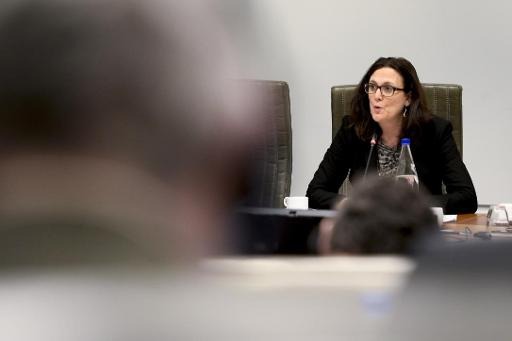This morning Greenpeace Netherlands released documents of EU’s negotiations with the US on a Transatlantic Trade and Investment Partnership (TTIP). The documents are not top secret but have been classified as “restricted”, the lowest classification level.
According to Greenpeace Netherlands the documents represents two-thirds of the TTIP draft text as of the latest round of talks in April and cover a range of issues from telecoms to food and agriculture and trade barriers.
The documents are available on www.ttip-leaks.org for “everyone to read, because democracy needs transparency,” Greenpeace states.
“We call on citizens, civil society, politicians and businesses to engage in this debate openly and without fear,” says Sylvia Borren, Executive Director Greenpeace Netherlands. “We call on the negotiators to release the latest, complete text to facilitate that discussion.”
The documents are described by Greenpeace as “consolidated texts where the EU and US positions on issues are shown side by side. This step in the negotiation process allows us to see the areas where the EU and US are close to agreement, and where compromises and concessions would still need to be made.”
Of the documents released by Greenpeace Netherlands, in total 248 pages, 13 chapters offer for the first time the position of the US.
The leaked documents prompted Cecilia Malmström, Commissioner for trade, to write on her blog that a “number of misconceptions are floating around”. Without denying the authenticity of the documents she explains that “so-called ´consolidated texts’ in a trade negotiation are not the same thing as an outcome. They reflect each side's negotiating position, nothing else.”
She also claimed that the European Commission in the past year has opened up the negotiations to make our positions on all matters in the negotiations public. “After each negotiating round, the Commission “publishes reports as well as our position papers and textual proposals. So the positions of the EU are well-known and nothing new.”
She continued that contrary to Greenpeace claims “No EU trade agreement will ever lower our level of protection of consumers, or food safety, or of the environment. Trade agreements will not change our laws on GMOs, or how to produce safe beef, or how to protect the environment.”
“Any EU trade deal can only change regulation by making it stronger.”
Her chief negotiator, Ignacio Garcia Bercero, stated at a press conference today (2 May) that last week’s EU-US negotiations in New York, the 13th negotiation round, had been comprehensive and resulted in “reasonable progress”. The aim had been to draft a consolidated text before the summer break.
He described the “consolidated” text as “joint document” of both parties but denied as the Commissioner that they reflected any outcome of the negotiations or any agreement. He also stated that Greenpeace’s statements were “flatly wrong”.
Greenpeace claims that “long standing environmental protections appear to be dropped” in the text and that “climate protection will be harder under TTIP”.
According to Greenpeace, the text also spells “the end of the precautionary principle” because it is not mentioned in the chapter on Regulatory Cooperation or in any other of the obtained chapters. The Commission claims that it has made its position on this clear elsewhere.
The precautionary principle refers to risk management and puts the burden of proof that an action or policy is not harmful to health or the environment on those taking the action.
“On the other hand the US demand for a ‘risk based’ approach that aims to manage hazardous substances rather than avoid them, finds its way into various chapters. This approach undermines the ability of regulators to take preventive measures, for example regarding controversial substances like hormone disrupting chemicals,” Greenpeace writes.
Greenpeace also claims that the proposals in the leaked documents are “opening the door for corporate takeover.”
“While the proposals threaten environmental and consumer protection, big business gets what it wants. Opportunities to participate in decision making are granted to corporations to intervene at the earliest stages of the decision making process.”
For an outsider the consolidated text appears as a draft agreement with annotations or comments by EU and US.
However, Commissioner Malmström writes in her blog, that “In areas where we are too far apart in a negotiation, we simply will not agree. In that sense, many of today's alarmist headlines are a storm in a teacup.”
The Brussels Times
Leaked documents on EU-US trade negotiations: storm in a teacup?

